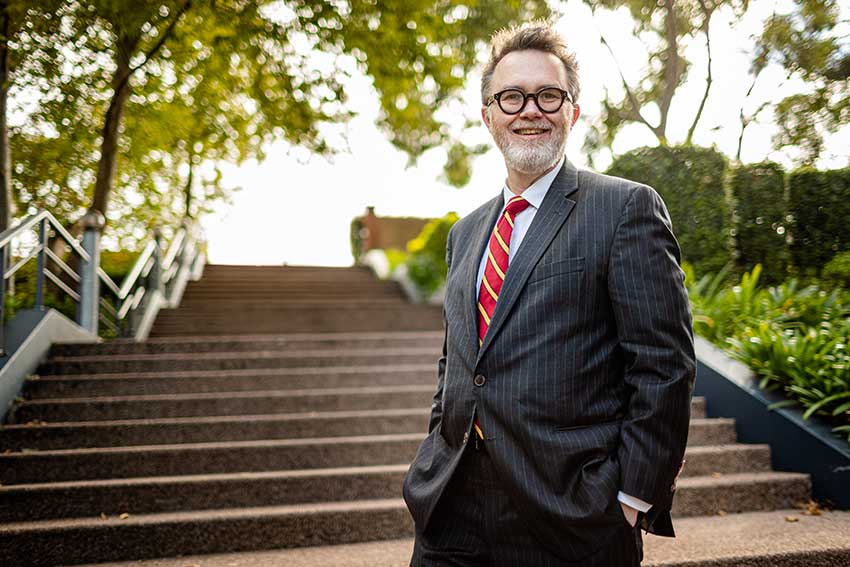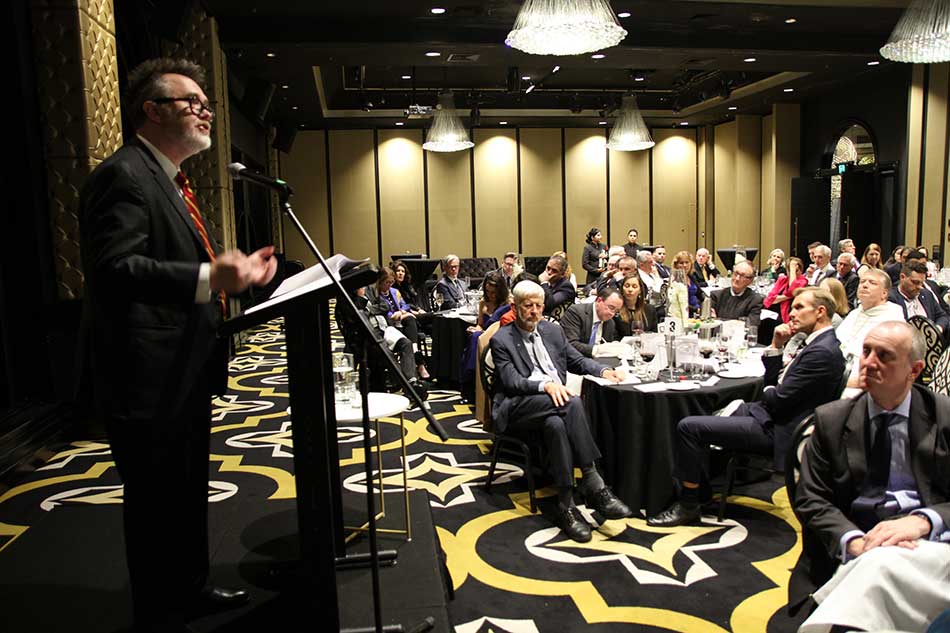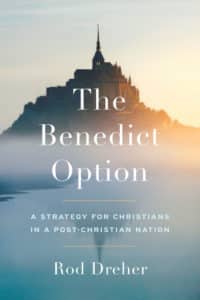
Rod Dreher says Western Civilisation is over – but most Christians haven’t cottoned on to that. Yet they’re essential to the future. So what are they to do?
Don’t be fooled by the neat suit, funky glasses and ready smile; Rod Dreher is a serious 21st Century prophet sounding the alarm for Christians in western countries who he says are mostly unaware of the peril we are in.
A full-frontal attack on religious freedom is underway in the US and those who can read the signs of the times know that “something very big is happening” around the world, the well-known journalist and blogger told The Catholic Weekly during his first Australian tour for Campion College Australia and The Ramsey Centre.
The fact his 2017 book, The Benedict Option: A strategy for Christians in post-Christian Nation, shot to The New York Times Best-Sellers’ List and has now been translated into about 11 languages shows that many agree.
In it, the senior editor at The American Conservative argues that as orthodox Christian values evaporate from the mainstream and crises strip the church of its power and influence, Christians should follow the example of St Benedict and form small, faithful communities to preserve the faith and pass it on to our children.
The church today must rediscover the roots of our faith tradition, get better at telling its own story, and above all, stand our ground on religious liberty. Here are some highlights from the conversation with Marilyn Rodrigues in Sydney:
Why did you write the Benedict Option?
As early as 2004 I began to notice a fragmentation in the American public, a specific kind of fragmentation where we couldn’t argue together or even share the same base on which to make our arguments.
I kept asking myself why this was happening. I came across a book called After Virtue by Alisdair MacIntyre, one of the greatest philosophers of the 20th century.
MacIntyre said that we’re in a time of great fragmentation in the West because the West tried to create a civilisation without God (in the Enlightenment) and you can’t do that with reason alone.
He said, therefore, we are at a place in our civilisation that is like the fall of the Roman Empire and that we need “another, doubtless very different, St Benedict”.
I wanted to ask what does the Benedict of the 20th century look like? I wanted to look to Christians, Catholics, Eastern Orthodox and Protestants who were living in a countercultural way and in a way that I thought would help the Church survive this time of dissolution.

What do you mean by a post-Christian culture?
I don’t mean there are no Christians left; clearly there are. I mean that we live in a culture that no longer understands itself as Christian by the biblical narrative.
The trends have only gotten worse in terms of the falling away from the faith by the millennial generation and the so-called ‘Generation Z’. They’re just not interested in the faith and there are some Christians who have this really perverted view of what Christianity means, such that they believe that, well, you’ve got Donald Trump in the White House, we’re in a Christian revival. No.
While there are good reasons, I think, for people to have voted for Trump, if only to protect religious liberty and the right to life, Trump is not a Christian himself and is doing tremendous damage in many ways.
But I think American Christians, conservative ones, have got into the habit of thinking that if we only elect the right people, get the right judges on the bench everything is going to be ok. Meanwhile, they’ve neglected the formation of themselves and their children to disastrous effect.
Your critics say it’s impossible or not right for intentional Christians to give up on mainstream culture and retreat into ghettos.
That has been the greatest challenge. People who haven’t read [my book] assume that’s what I’m saying. It’s almost as if there is this perverse desire not to understand the argument.
The argument is not that we should withdraw and head for the hills, but that if we are going to live in the world as faithful Christians then we have to live certain monastic virtues including withdrawal, to a certain extent, and to our Christian communities and to contemplation and to study, to establish more of a balance.
But I’ve had to fight like crazy with people to get them to understand this. I think the reason is that people are terrified that they are going to have to change their lives; they’d rather be ruined than changed.
You moved from believing politics could change the world to prioritising the need for ever-deepening personal conversion. How?
I learned this lesson from reading Dante, the need to heal the world and bring peace to the world by bringing peace to your heart.
Back in 2013 or 14 I was going through a really serious personal crisis and read The Divine Comedy for the first time. Dante was giving such practical advice in the 14th century to start with your own heart and move outward from there. I found that to be true in practice in my own life and it think it is true for all Christians in this world. It’s not that we shouldn’t care about social justice and things like that. We should.
But if we don’t start with deep conversion of our own hearts and create that peace within us, and build on that peace outward into our families into our parish life, schools and so forth it’s not going to mean anything.

How have you and your wife tried to nurture a Christian formation in your children?
We homeschooled for a while and then seven years ago they entered a classical Christian school in Louisiana. We have very a different idea about what education is: it’s about forming the soul.
We strictly limit their intake of media, curating what they watch, and have a strict policy about smartphones, though our eldest is now at university and obviously has one.
Finally, we make a point to be at church, going to liturgy, to Vespers, observing the fasts and making the rhythm of the Church the rhythm of our lives.
You say in the book that one political focus we cannot relinquish is to fight for religious freedom.
For me, mission number one for Christians, politically, in the US at least, is to protect our constitutional guarantee of freedom of religion and freedom of speech.
Related article: Meet the author of the end of the world
It is incredibly contested right now. Now I don’t believe freedom of religion is an absolute thing. We live in a pluralistic liberal democracy. It has to be balanced. But there is a full-frontal attack on freedom of religion coming from the Left and it’s gaining strength for two reasons.
One, the cultural elite – especially the legal elites – are aggressively secular and they don’t understand religion. Secondly, the young – even if they’ve been raised in religious homes – all of us in the church have done such a terrible job of passing on what it means to be a Christian that they don’t understand why freedom of religion is so important.
I think it’s extremely important to vote for politicians who will allow us to maintain those spaces within which we can form the next generation – not just in church on Sunday morning but the liberty of Christian schools, Christian professionals and others to practice the faith without having to sign some sort of a statement that violates their conscience – and that is already here in many professions.
